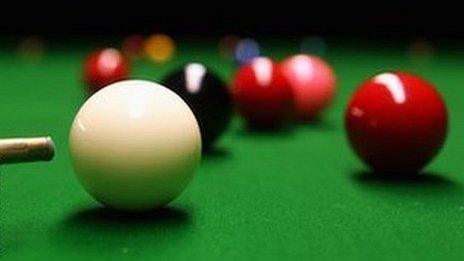Steve Davis: Retired snooker great says life 'like living in a big holiday camp'
- Published
Steve Davis retires after 38 years in snooker
"Weird. But great." That's one punter's verdict on a Steve Davis DJ set. But it would also be a fitting epitaph. From the most boring man on the baize to champion of avant garde electronica. 'Interesting' doesn't begin to do it justice.
At the Bloc Festival in Minehead, the crowd wear Steve Davis masks. Behind the decks the man himself is in a state of ecstasy. Never mind the earplugs. No surprise that the first album he bought was In Deep, by 70s' prog rockers Argent. Davis doesn't do things by halves. Snooker, music, it's all an obsession.
Shyness, as Morrissey once noted, can stop you from doing all the things in life you'd like to. Try telling Davis that. As he slips into sporting retirement at the age of 58, he can reflect on a life well lived and look forward to a grand old life to come.
Davis describes his youthful diffidence as almost an affliction. But the cerebral sport of snooker first provided a sanctuary before becoming his stage.
Steve Davis: World's most unlikely DJ?
"Being shy is a genuine problem," says the six-time world champion and current host of The Interesting Alternative Show on Phoenix FM.
"But I was very fortunate to find something I was good at, because it stopped that shyness from overwhelming me. I was a nobody until someone put a cue in my hands, when I suddenly became a somebody. That was quite a turn-on."
Someone first put a cue in Davis' hands at Plumstead Working Men's Club in 1969. That someone being his old man, Bill, an average snooker player but a stickler for fundamentals and detail.
"He'd always be reading from Joe Davis' book, How I Play Snooker," says Davis, referring to the 15-time world champion who is only related in spirit. "He'd stand there with a cue over my head, making sure I didn't move it. I'd say: 'Are you sure that's right?' And he'd say: 'Yeah, it says so in the Bible.'
"There were no decent players in the working men's clubs, nobody to feed off. We didn't know anything about positional play or tactics, so I just worked on technique. And those basic rules my father instilled in me still hold today: try to make yourself as solid as possible, keep your head still, make sure the cue goes through straight.
"Soon snooker became this all-consuming passion. I was a bit of a control freak, so snooker was perfect for me. I was fascinated by the idea of having control over the balls. And when I started winning tournaments, it became even more exciting and even more of an obsession."
Listen: 'Greatest result of all time' - Davis on snooker career
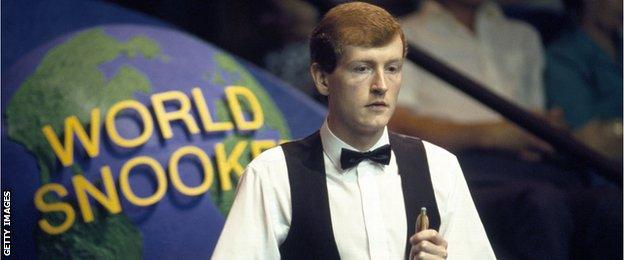
Steve Davis won the first of his world titles in 1981 starting a decade of dominance
When Davis saw French art rockers Magma at the Camden Roundhouse in the mid-70s, it "blew his mind". The really interesting thing about Davis is that he was always more interesting than people thought. Magma sing in an invented language called Kobaian, have released 10 concept albums and perform 'space operas'. Back then, they made Genesis look like The Carpenters.
But it says a lot about Davis' obsession with snooker that music became his mistress and punk passed him by completely. All of a sudden this esoteric table game was a television sensation and Davis one of its biggest stars.
"I sometimes wonder how long I would have persevered if the game hadn't become popular on TV," says Davis. "I might have played for a club team but I don't think I would have gone as deep as I did.
"But somebody at the BBC decided it would be a good idea to start showing the World Championship in the late 70s. In its entirety. Just ridiculous. And that person effectively mapped out my life for me. God knows what I would have been otherwise. A banker? An accountant? I can't believe my luck."
Right place, right time, right man behind him. "Early on I was just a snooker machine, so Barry Hearn did all my talking for me. People thought I was his product - and I was.
"He was just an incredible salesperson, and a fantastic sports therapist without even knowing it. When the England cricket team were always losing back in the 90s, I thought that if they made Barry captain they'd start winning. He was my mate, my agent and the perfect man to have in my corner."
Steve Davis' career in numbers | |
|---|---|
World titles: Six (1981,1983, 1984, 1987,1988,1989) | Ranking tournament wins: 28 |
Century breaks: 355 | Career winnings: £5,613,536 |
Davis won all six of his world titles in the 1980s, as well as the UK Championship six times and the Masters twice. Snooker's heyday in Britain was Davis' heyday. You couldn't keep 'The Nugget' off the back pages.
"Being centre of attention fed the obsession, because suddenly it felt even more important and special. Players were treated like pop stars. I did a signing session in a sports shop in London and the security couldn't hold the people back. It was shocking to see that level of fervour, I couldn't get my head around it."
Hearn realised there were a lot of interesting people out there who shared Davis' passion for snooker. Slow it might have been, but it was also gripping.
"People often ask me now: 'Do you think they should make snooker faster, like Twenty20 cricket?' But people who like snooker, who sit there for hour after hour watching two grown men trying to put a small ball into a slightly bigger hole with a pointy stick, are slightly different.
"They don't need everything to be a quick fix, they'd rather have something to wrestle with and get their teeth into. There are still people out there who want to read a good, long book. Not everybody wants to skim through Twitter.
"Snooker is about the narrative, growing with the story. It doesn't have to be fast and furious. Someone once wrote that any sport that has commentators that whisper can't be a sport. But where there's whispering, there's drama.
"Can you imagine if they'd had a shot-clock in the final frame of my 1985 final against Dennis Taylor? It would have ruined it. There were 18.5 million people watching and it went on for 70 minutes. Seventy minutes of tension and agony."
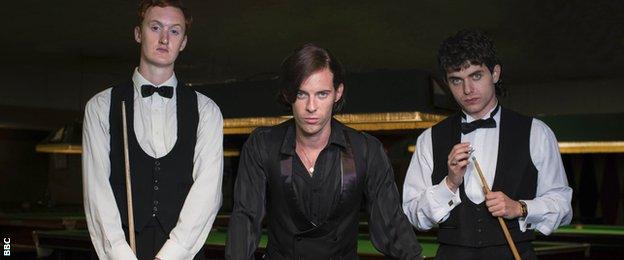
Steve Davis' career was portrayed recently in the BBC drama The Rack Pack
That snooker is drama is fact, as the recent BBC play The Rack Pack further proved. And while Davis says the programme makers played with the truth, he is happy to admit that most of it was accurate in essence.
"I did start out as a nerd and Alex Higgins was this frightening character. He had this pent-up aggression inside him, something like hate. He was almost feral and I was always unnerved in his company. He reminded me of that cartoon character Taz - wherever he went he left a trail of destruction behind him.
"He loved the game so much and I loved that energy. I played him once in an exhibition match and what should have been a bit of fun became just so intense.
"While I was at the table potting all the balls, I could sense everyone was watching him smoking four cigarettes at a time and drinking pint after pint of lager. He was more entertaining sitting in his chair than I was playing.
"Suddenly, he called the waitress over and asked for another beer. He never did anything quietly, he always made a big song and dance about it. She brought the beer over and all of a sudden, out of the corner of my eye, I could see him pouring his pint of beer into a half-pint glass that was already on the table. The beer was frothing up like Mount Vesuvius, going all over the table. And because he was still staring at me, he didn't even know it was happening."
With more flamboyant players on the scene, Hearn was happy to market Davis as an automaton, crushing the fearful and the feckless in his path. And while Davis did emerge from his shell as the 80s wore on, it was always war on the table.
"I got a kick out of bullying other players, probably without even knowing it. If you're very good at a sport, it's because you're a bully. And when a bully starts getting bullied by someone else, it can be difficult to take. So when Stephen Hendry came on the scene, that was the hardest thing I ever had to deal with."
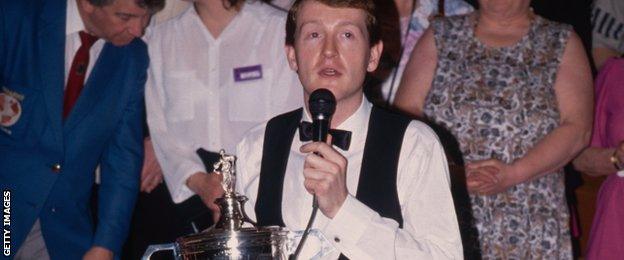
Steve Davis won the last of his six World Championships in 1989
Davis never reached another Crucible final after his last triumph in 1989. Hendry won in 1990 and had seven world titles by the time the decade was done.
"I'd had it all my own way for so long, I thought it was never going to stop. So I hated the 90s and I hated Stephen Hendry to a degree. Not as a person, but what he stood for. I hated him for exactly the same reason Alex Higgins hated me.
"When Ronnie O'Sullivan came along, Stephen accepted he was going to take over his mantle as the world's best player - but it took me ages to accept that I was no longer the best player in the world and Stephen was.
"If I went out of a tournament, I wouldn't want him to win it. I resented his success, even after all the success I'd had. During the 90s, I didn't want to believe the World Championship was still going on. Whenever he won it, I'd turn the telly over because I didn't want to see him lift the trophy. Pathetic."
Davis did win more events but suddenly his game was of another era. Whereas Davis would pot a few balls, retreat and wait for his opponent to let him in again, Hendry just potted balls. The way Hendry played the game is how almost everybody plays the game today. Hendry was the game-changer, not O'Sullivan.
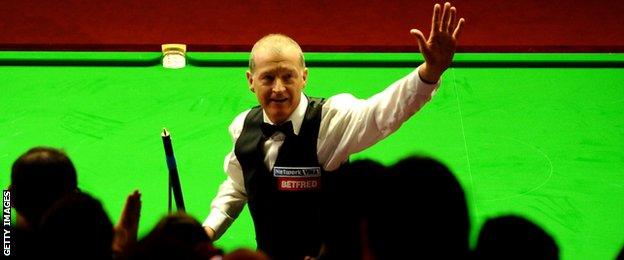
Steve Davis was knocked out in the first round of qualifying for this year's World Championship
Davis is modest enough to admit that even in his pomp he would have been "short of firepower" in the modern game - "like John Higgins, but with fewer bullets".
And he suggests he only carried on playing for as long as he did - he was still scrapping with the kids in qualifying this year, 37 years after his Crucible debut - to keep his dad happy.
"My father only recently passed away and I've probably been playing for him for a while now. It was a way of inspiring him to get up, walk around the snooker table and knock a few balls about. He was my coach and my number one fan. But now he's gone, that motivation is no longer there.
"I think he loved snooker more than me. He was still knocking balls about towards the very end, whereas I couldn't be bothered. Every player has a love-hate relationship with snooker. All that practice can cause you to fall out of love with it and when you're not winning any more, it's even harder to enjoy.
"That's why I find Jimmy White such an amazing person. He's still out there fighting, practising every day, going through the mill to stay on the tour. He still thinks he can win things. But now he's the last of the Mohicans."
More from snooker |
|---|
Davis says he'll still play for fun, continue coaching, commentating and trying to coax money out of the government for grassroots snooker. But enough of the game that made him, let's talk more about Magma.
"I just happened to be in this record shop a few years back, flicking through the racks, and I spotted this Magma album. I'd moved into collecting soul music and I didn't know they were still going. I took it home, listened to it and thought: 'Blimey, this is brilliant, I wonder if I could get them over?'
"So I paid for them all to come over and play a few nights in London. There was about 14 of them, the hotel bill was astonishing.
"I was standing in the crowd watching the place fill up and the first bloke who walked in the door was wearing an Afghan coat, like he was stuck in the 70s. But the next bloke who walked in was wearing a three-piece suit and carrying a briefcase. That's life, people go off in all sorts of different directions.
"I was in this high-end delicatessen the other day. Usually, someone will ask me to sign something for their mum. But on this occasion, as I was walking out, this young bloke ran after me and whispered: 'I love techno!'
"One minute I'm doing my radio show, the next minute I've been invited to DJ at the Bloc Festival. I don't think it's because I'm any good at DJing, more that I'm this weird snooker player playing obscure records.
"But I enjoy sharing my passion with other people, it's a buzz. And all of a sudden, people are asking me to do more. I'm DJing in Dalston in May."
Not even in Barry Hearn's wildest dreams would he have seen Davis DJing for the luxuriantly bearded hipsters of east London. But Davis has always been his own man and people have always loved him for it.
"It's lovely to have been part of people's lives for so long. Being thrown in the deep end like I was brought out things in me I didn't even know existed. My life is like living in a big holiday camp, where everybody's nice to me."
- Published17 April 2016
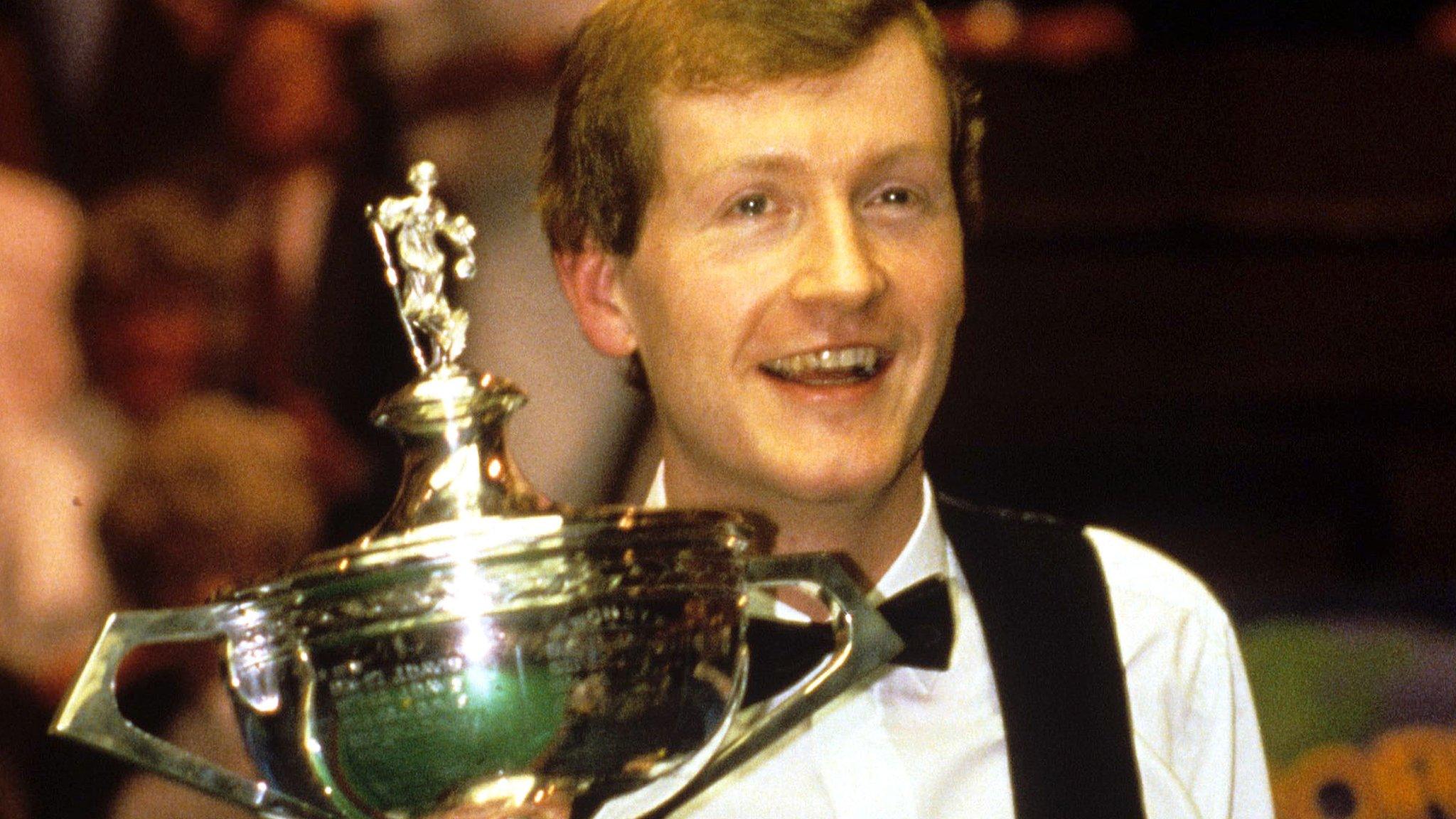
- Published15 April 2016
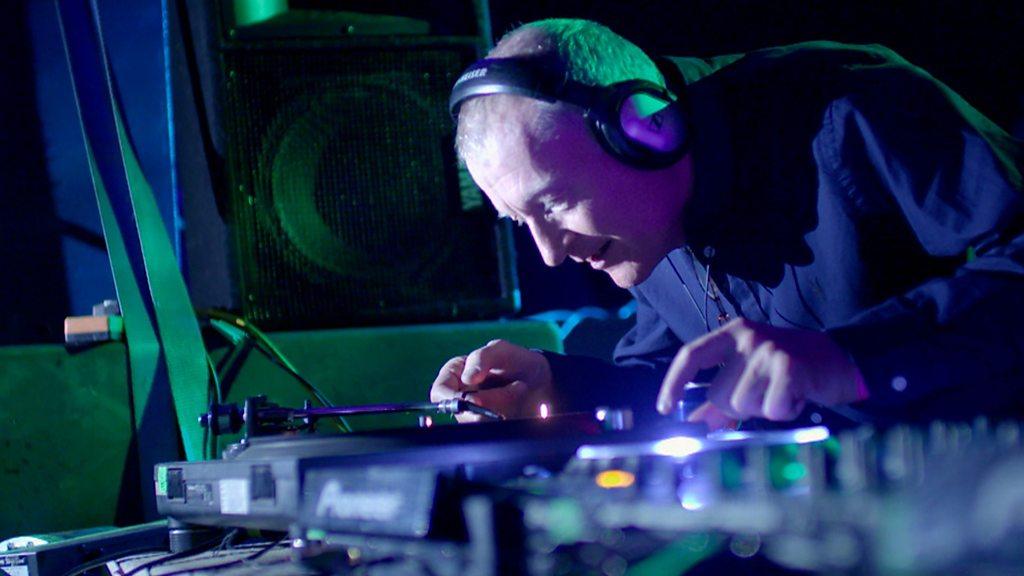
- Published30 April 2018
